Inspiring minds come together for TEDxKAUST
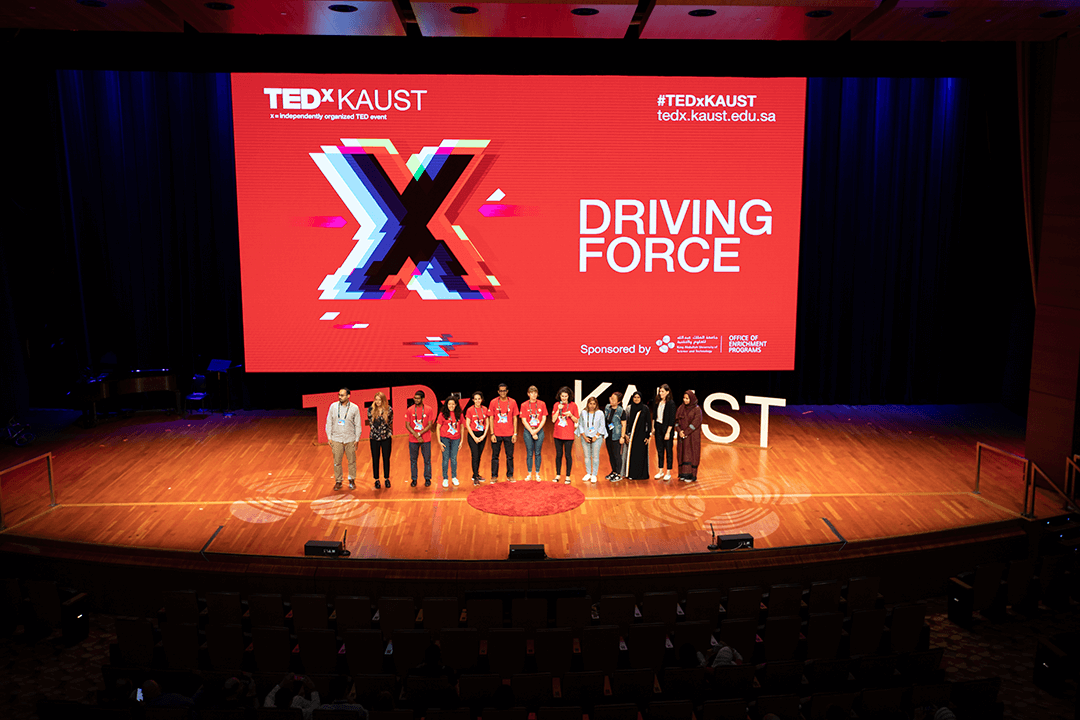
The University recently held its second TEDxKAUST event, which featured six inspiring speakers from the community discussing the theme of ‘Driving Force.’ Photo by Khulud Muath.
By David Murphy and Caitlin Clark, KAUST News
The University held its second TEDx event on August 31, which focused on the theme of "Driving Force." Sponsored by the KAUST Office of Enrichment Programs, which is led by Marie-Laure Boulot, director of Enrichment Programs, the event featured six faculty, staff, student and KAUST community member speakers delivering talks that encouraged attendees to unleash their potential for the betterment of the world.
Over the course of the day, TEDxKAUST speakers talked about their experiences with success, failure and overcoming obstacles, and how sometimes seemingly insignificant acts can alter the course of one's personal and professional life.
"TEDxKAUST is a student-led event that gives [the University's] graduate students the opportunity to organize and present to the entire KAUST community a TED-like experience with inspiring stories from faculty, staff, students and community members," explained Mireille Hantouche, a KAUST Ph.D. student and founder of the University's TEDx events.
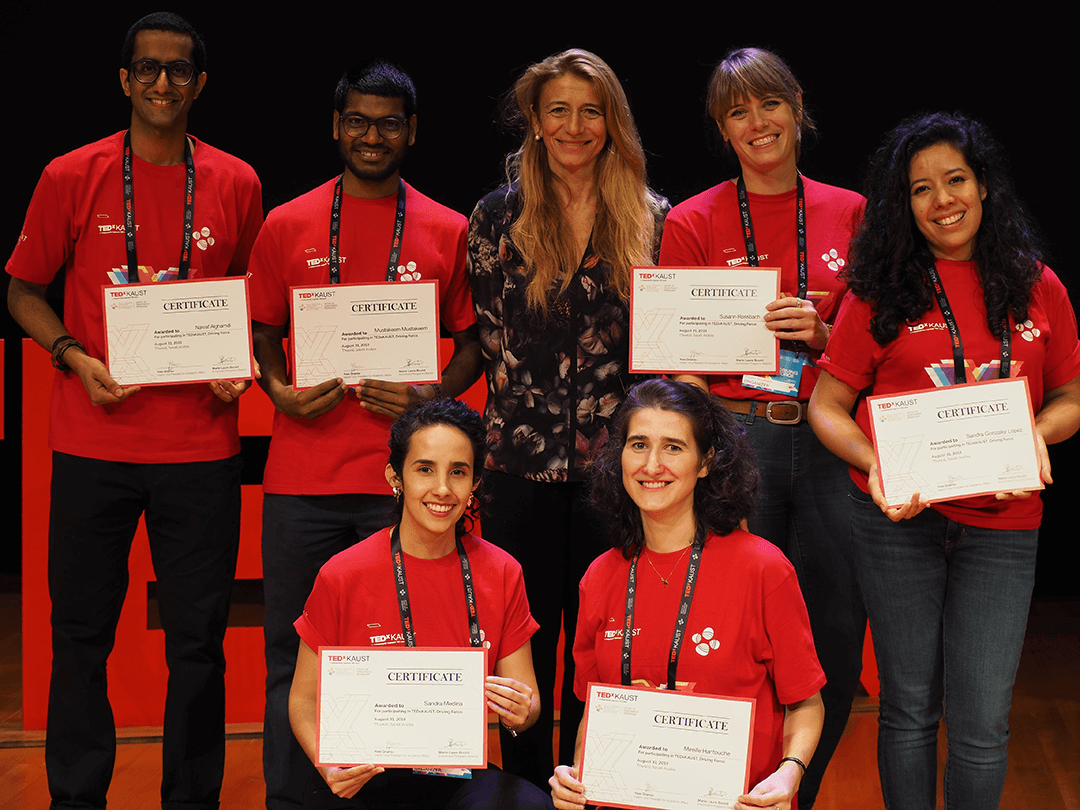
The organizing team for TEDxKAUST 2019 set up talks around the theme of ‘Driving Force.’ The 2019 team included: (front row, left to right) Sandra Medina, lead organizer Mireille Hantouche; (back row, left to right) Nawaf Alghamdi, Mustakeem Mustakeem, Director of Enrichment Programs Marie-Laure Boulot, Susann Roßbach and Sandra Patricia Gonzalez Lopez. File photo.
In December 2015, Hantouche established a student-led group under the University's Graduate Affairs called "Educate Explore Expand," in which students discussed topics outside of their research fields while watching TED talks.
Some group members showed interest in hosting KAUST's first TEDx event, spurring Hantouche to obtain a university license for TEDxKAUST. The first TEDxKAUST event took place in 2017 under the theme of "Impact Factor," with KAUST Associate Professor Mani Sarathy acting as faculty advisor for the event. For 2019's event, KAUST Assistant Professor Derya Baran was faculty advisor.
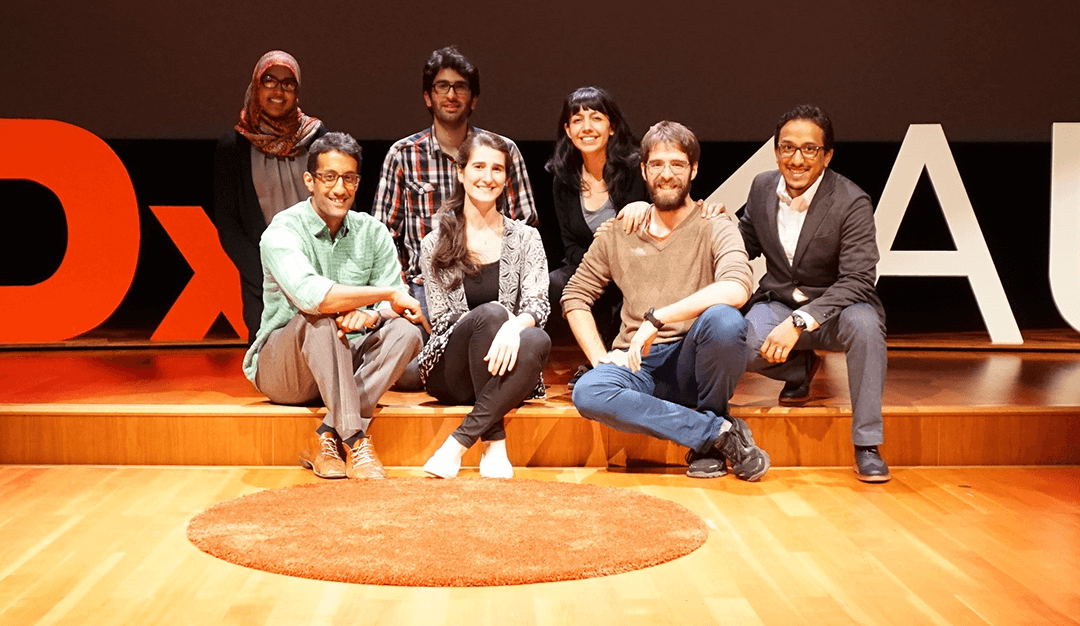
A team of KAUST students, including Ph.D. student Mireille Hantouche (front row, second from left), and faculty advisor Associate Professor Mani Sarathy (front row, first on left) organized the University's first TEDx event, which took place in 2017. File photo.
"We received great positive feedback for the 2017 event, so with the support of the Office of the Vice President of Academic Affairs and the Office of Enrichment Programs, I worked with another team of graduate students on this year's TEDxKAUST," Hantouche said. "At the heart of every TEDx event is a hardworking and very dedicated team of volunteers, making this a team effort. I hope to have guided and trained others to lead future TEDxKAUST events."
Below is an abridged sample of the six talks that took place during 2019's TEDxKAUST.
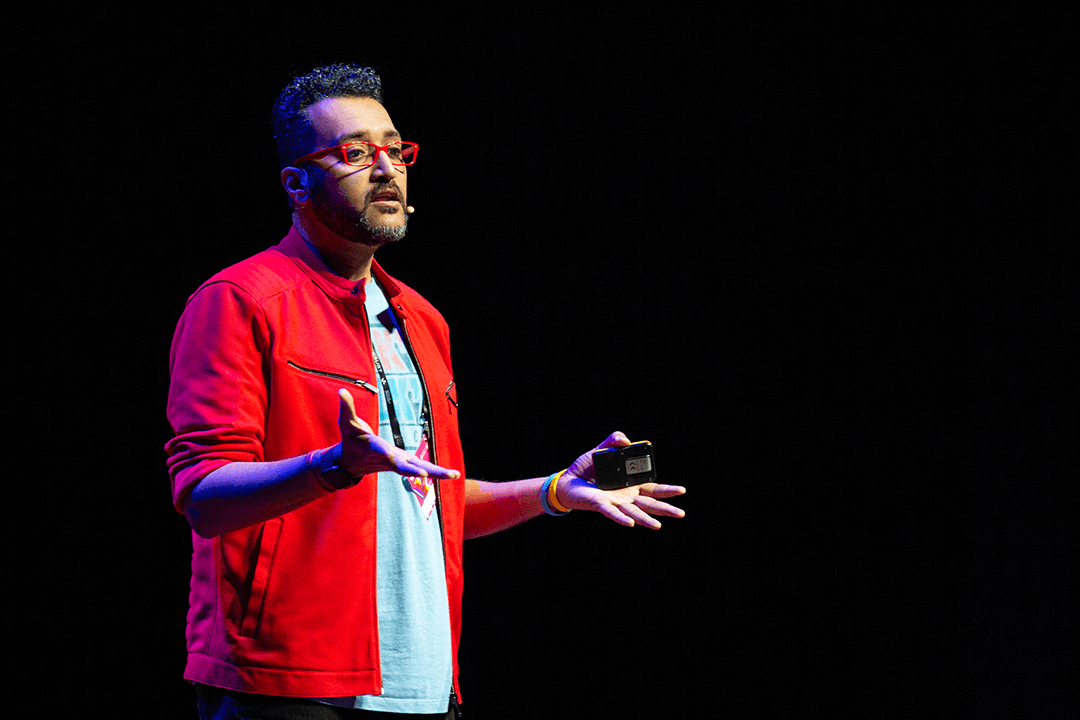
KAUST community member, puppeteer and TEDxKAUST speaker Ammar Aidaros Al-Sabban talks about turning his passions into a driving force for his career. Photo by Khulud Muath.
'26,000' by Ammar Aidaros Al-Sabban, KAUST community member and puppeteer
In his talk, Al-Sabban discussed how he turned his passion for people and knowledge into the driving force behind his career.
We only live once, right? And life is short! We live an average of 26,000 days. Twenty-six thousand! That's anything but short. Back in 2013, I realized that I was on day 12,500—even though I had everything I was told I should—an education, a great job, an amazing wife, [a] beautiful kid—half my life was gone, and I didn't accomplish half the things I wanted...Looking back, I didn't like what I saw. It wasn't me—it was someone else! That was my driving force, and that's what I want to talk about today—I didn't want to regret my life choices on day 26,000.
[W]e learn by trial and error, so when I looked back at my actions when I was young, I found five things that brought me joy: One, I doodled and scribbled on all my textbooks [and] even altered all my possessions; two, I daydreamed and spent a lot of time thinking; three, I watched TV and cartoons all the time; four, I liked to joke around and make people laugh; and five, I looked at things from different perspectives and always argued my point of view.
But today, I learned through trial and error how to turn [all of] them into a career.
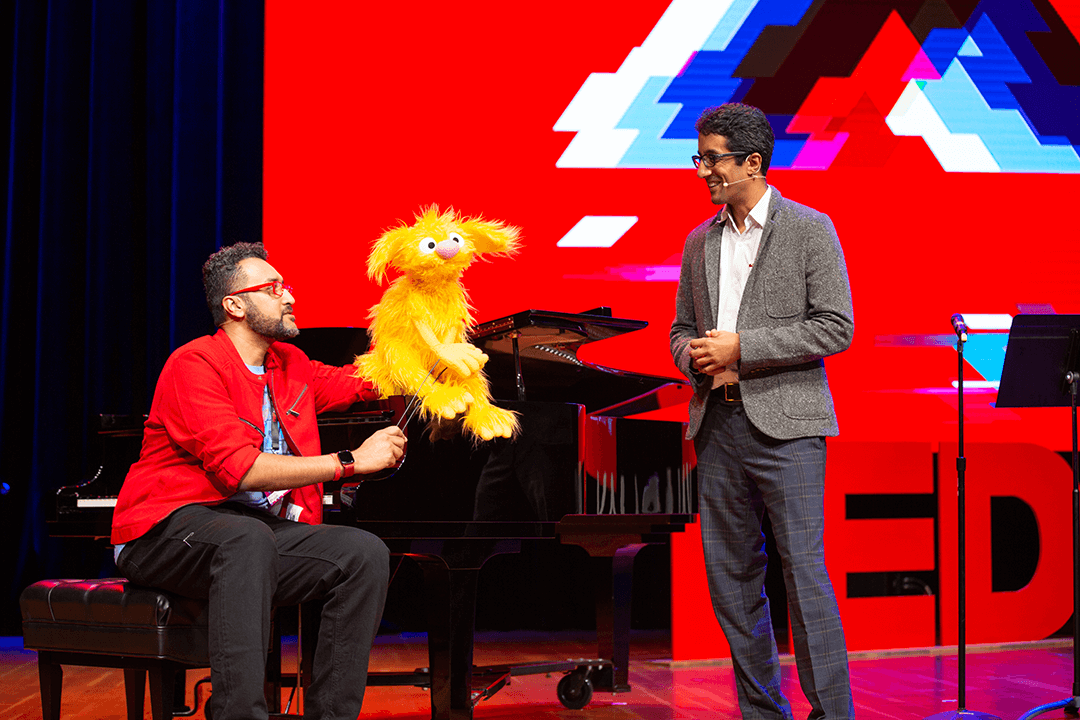
TEDxKAUST speaker Ammar Aidaros Al-Sabban (left) shows off one of his puppets to Mani Sarathy, the 2019 TEDx event's faculty advisor. Photo by Khulud Muath.
Doodling [equals] design, daydreams [equal] content creation, TV [equals] puppetry, voice acting and joking around [equal] comedy and talking [equals] podcasting.
Today, I get paid for doing all the things that I was [once] told not to do. Think back to your 5-year-old self—would [he or she] be happy with where you are today? If yes, congratulations! If it's no, try giving your childhood dreams a shot. I did, and the last 2,000 days of my life were the best and most productive in the 14,700 days of my existence!
It wasn't easy; it was sometimes embarrassing. I failed a lot and I had to get out of my comfort zone, but that's a small price to pay for a lifetime of joy and happiness—and to have no regrets on day 26,000.
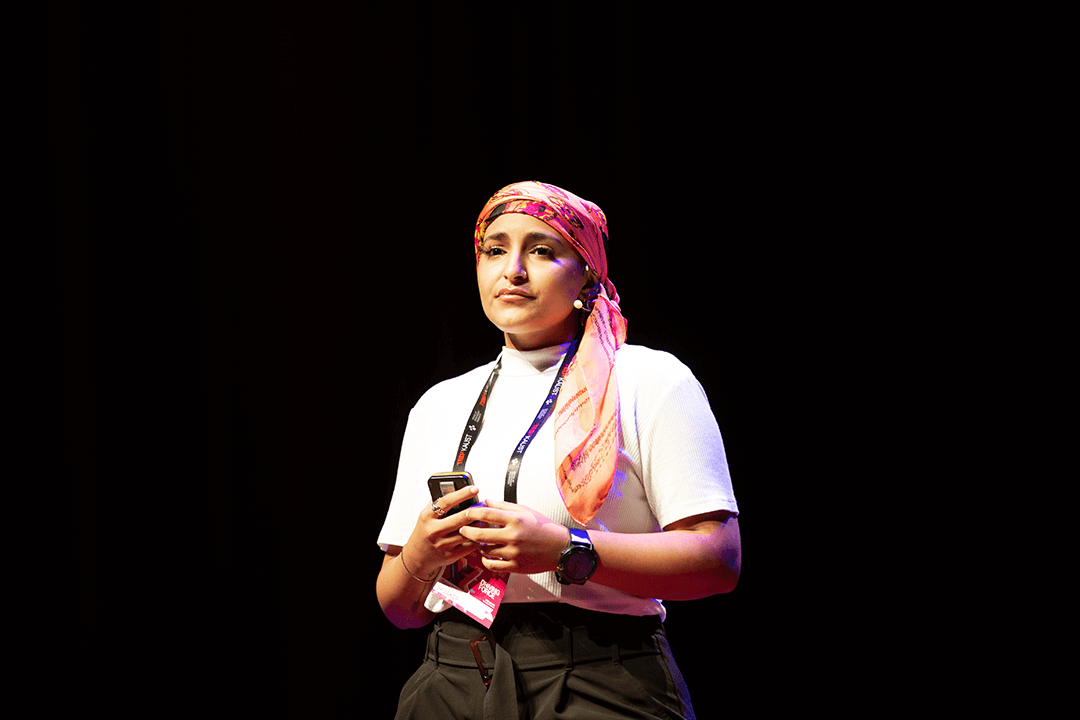
Baraa Luhaid, KAUST community member, entrepreneur and TEDxKAUST 2019 speaker, talks about her passion for cycling and turning it into an entrepreneurship journey. Photo by Khulud Muath.
'My Wheels of Change' by Baraa Luhaid, KAUST community member and entrepreneur
In her talk, Luhaid spoke about how uncertainty and the need for constant change are key elements in feeling truly alive. During her talk, she shared her story of struggles in her life to follow her passions and how she overcame them. She hopes to inspire girls in Saudi Arabia and around the world to pursue their dreams.
The fear was there everywhere—the fear of her losing her money, the fear of what the future is going to be, the fear of entering a field full of everyone but Saudi women.
[She and her brother] did not stop their entrepreneurship journey. They resumed selling [bicycles]. They turned their fearful dream into a startup—then a brand, then a bicycle shop. And actually they turned it into an investable business.
[As] a female entrepreneur, I wanted to share that passion [for cycling] with all women—except back then, it was almost impossible for women to cycle in their traditional abaya. For those of you not familiar with the abaya, it's the traditional outfit that women wear. It's similar to a dress, and it has the potential 99.9 percent [of the time] to get hooked into the chain or in the wheel when you cycle.
So I thought I must do something. I wanted to transfer my passion into a design—an outfit—that allows all Muslim women, not only Saudi [women], to cycle, to feel the freedom that I felt once. But I'm not a designer, I'm an entrepreneur. But this is what entrepreneurship is all about.
A great discovery—I found out my mom [is] a great tailor. She helped me design the first design. It didn't look so cool in the beginning, but it was good enough and from there, I was fortunate enough to showcase the design in Saudi Design Week 2018.
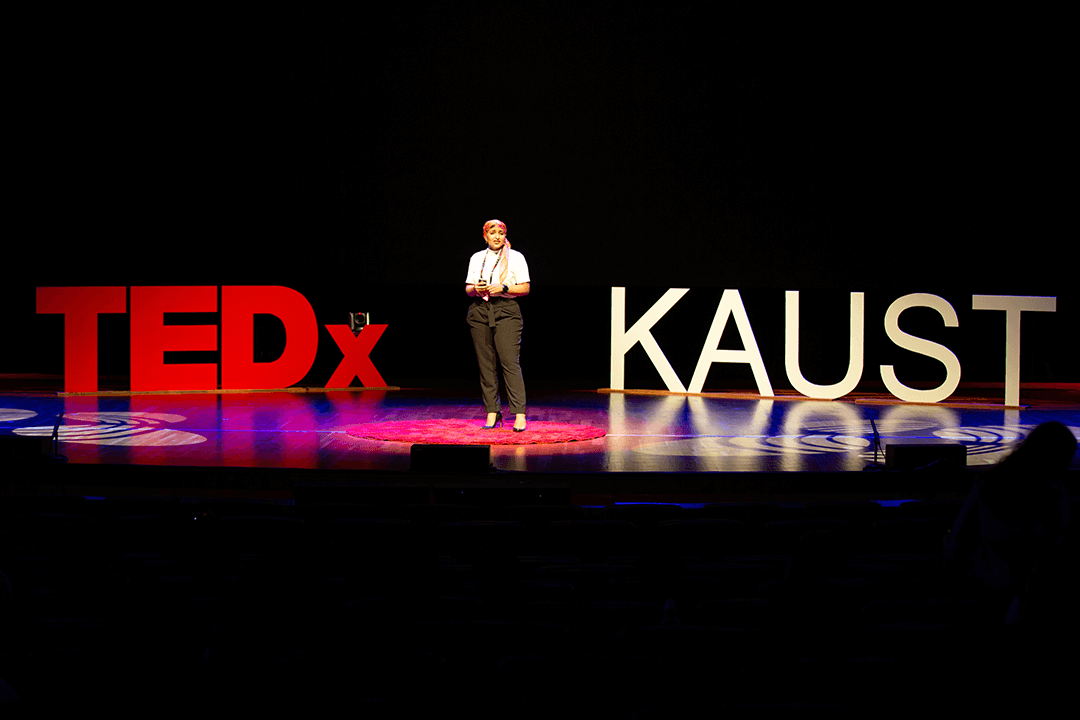
TEDxKAUST 2019 speaker Baraa Luhaid told audience members to examine their fears and turn them into 'wheels of change.' Photo by Khulud Muath.
What was once an act of fear is now joining one of Nike's women's projects.
The sports cycling abaya that I designed was there, but it was difficult for all women to cycle in public. So I thought I should do something about this. How? I wanted to change this…The only thing I could do was to be one of the main players in the game to change that.
So I worked with the Saudi Cycling Federation and I helped build from the ground up opportunities for women in the cycling world—not only by building two training centers in Riyadh, but I also created the first national women's team. I also became the first female board member in the Saudi Cycling Federation.
That fearful woman is this year joining a global campaign to represent the Middle East [as one] out of five people from around the world who have made change in their own communities.
I'm not here today to tell you that fear is an illusion or something you can go easily around. Fear is a fundamental human instinct that we cannot resist, but we can make it work for us.
One thing I wanted to ask you today—when you get back home, to [get] a pen and a paper and write all the things that you fear. Mine was riding a two-wheeled bicycle, and I turned that fear of wheels into wheels of change.
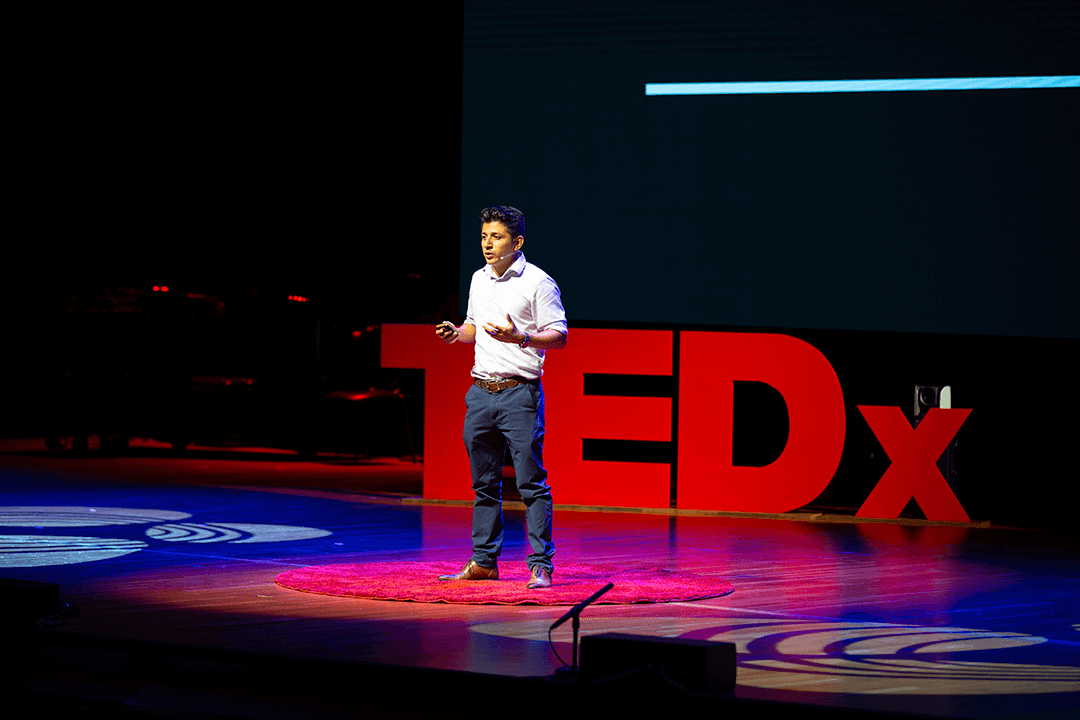
KAUST alumnus, co-founder of startup Sadeem and TEDxKAUST speaker Esteban Sanchez-Canepa discusses overcoming fear and reaching success through passion and multiculturality. Photo by Khulud Muath.
'Human Forces of Entrepreneurship' by Esteban Sanchez-Canepa, KAUST alumnus and co-founder and chief technology officer of Sadeem Technology
In his talk, Sanchez-Canepa outlined the importance of inherent passion and multiculturality as key elements for success.
From my experience, there are two forces that can drive entrepreneurs to overcome fear, reach a state of constant innovation and ultimately a higher probability of success. These two forces are passion and multiculturality!
Academia was somewhat interesting for me, but I was definitely lost about my future. We should not be ashamed in recognizing that sometimes we feel lost in some moments of our lives because being lost has a bright side. When you are lost, you are keener to try new experiences. And the beauty of trying new experiences is that the probability of finding a passion to pursue in life increases. But in the end, it does not matter if you were born with [a] passion for entrepreneurship or you developed it later in your life—that passion will increase your chances to move away from failure.
Our team members come from four different continents. Cultural diversity is part of our identity, and we embrace it...After years of interacting daily with people with a completely different vision of life than mine, now I know that cultural diversity is actually similar to passion—it is a strong force that can drive entrepreneurs to excel.
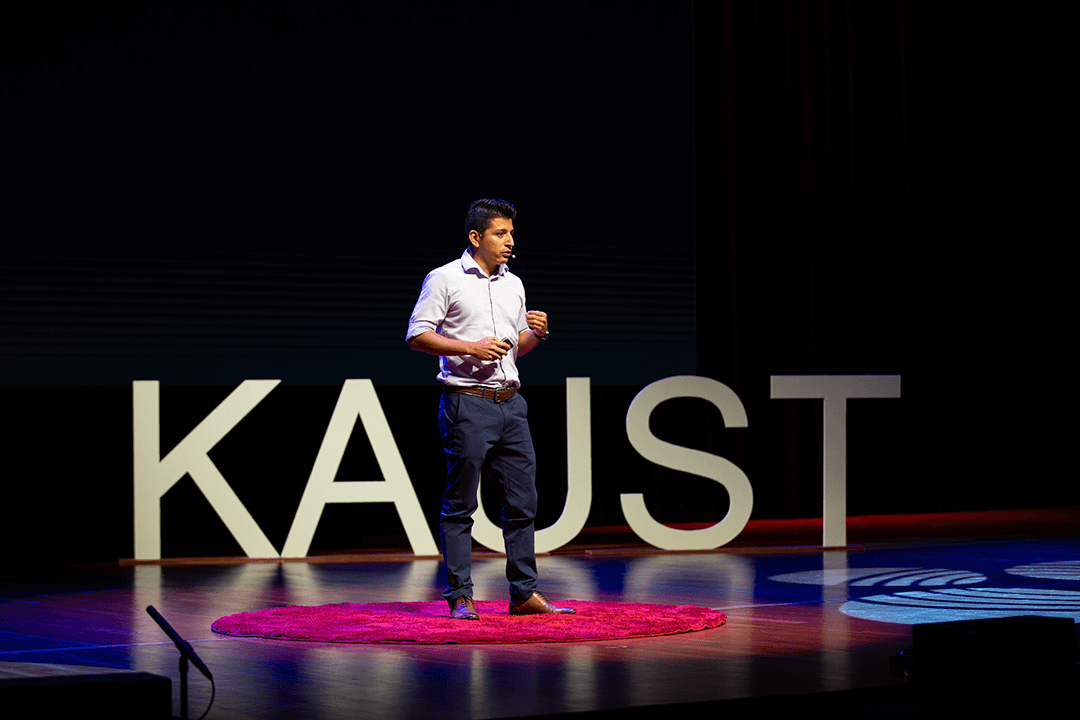
Entrepreneur Esteban Sanchez-Canepa told the TEDxKAUST audience to focus on trying new experiences, as through them, 'the probability of finding a passion to pursue in life increases.' Photo by Khulud Muath.
The amazing part of addressing a global problem like [urban flooding] with a culturally diverse team is how fast you can adapt your solution to local markets around the world...It would be really hard for a startup's team to install projects on different continents at the same time without cultural diversity. A company's adaptation to international markets is faster and more efficient with a diverse team.
Passion and multiculturality might give our team the chance to succeed as a startup, but these definitely go beyond entrepreneurship. The more we continue to be doers with inherent passion and multiculturality, the more we can impact our societies positively, regardless of where you go, who you are or what you do.
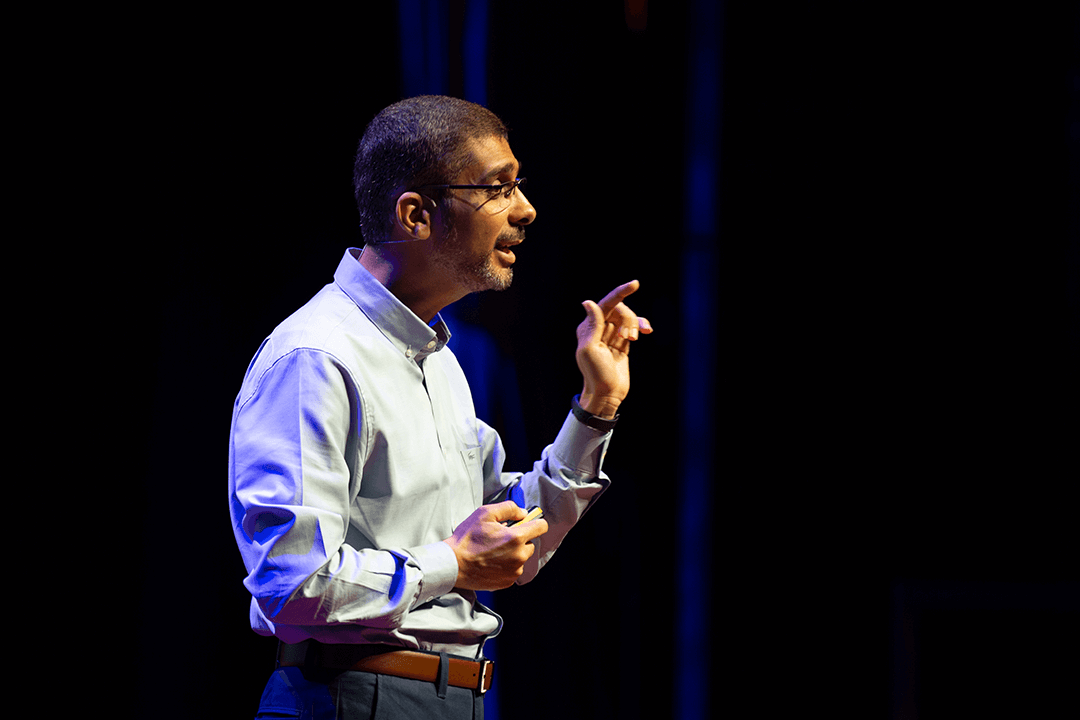
Research scientist and TEDxKAUST speaker Maged Serag outlines the importance of fundamental science in the lives of young and old. Photo by Khulud Muath.
'The Subtle Secret of Life' by Maged Serag, KAUST research scientist
In his talk, Serag discussed how fundamental science can transform our lives and inspire children, young people, researchers and scientists to unravel more fundamental theories for the advancement of humanity.
Why should you care about fundamental science? Let me ask the question in another way. What is the impact of science [that] we care most [about] and feel excited about in our daily [lives]? I believe that many of us care most about the applications, especially the state-of-the-art technologies; our smartphones; our Bluetooth headphones; and other gadgets. Indeed, they [make] our [lives] easier. But, we have to learn that the technologies in these devices will die very soon and will be replaced by new ones.
Albert Einstein developed the general theory of relativity more than 100 years ago. People in his era did not know whether it could be used to make something useful—but look at it now. How many applications are using Einstein's theories? Starting from mobile phones and their GPS to the International Space Station, his theories helped us to put satellites around the Earth and to reach Mars. Fundamental science is around us and will stay with us. What we learned about fundamental science 100 years ago is what we see today as groundbreaking technologies.
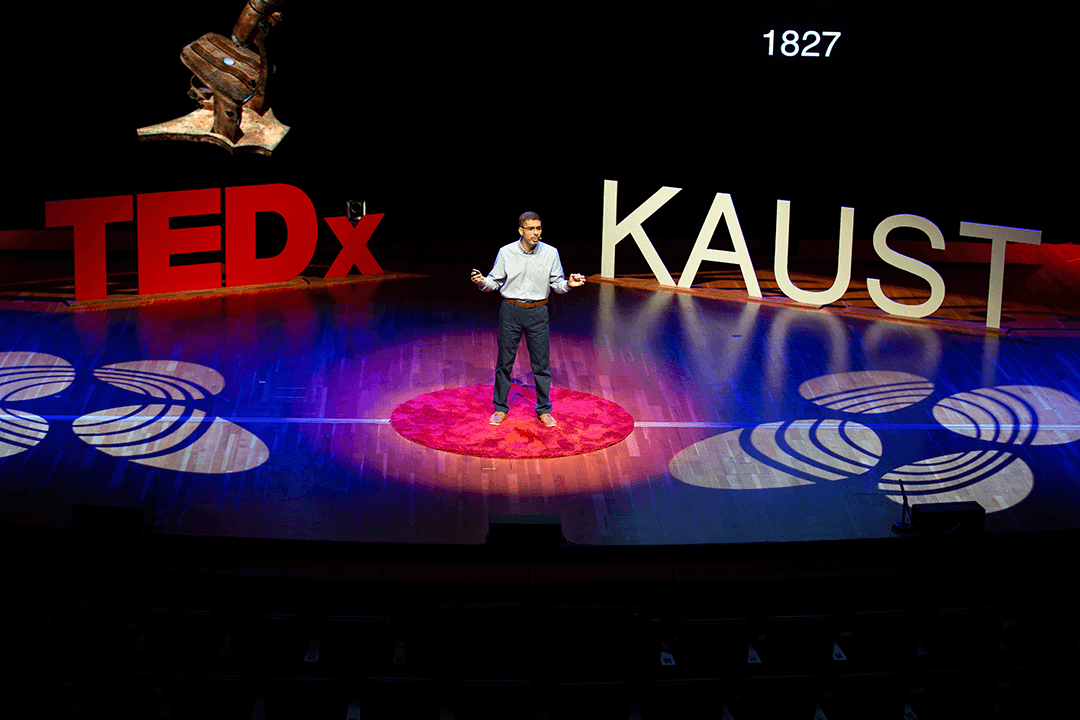
TEDxKAUST speaker Maged Serag noted to the audience that through learning 'the fundamentals of ourselves, our nature and our universe,' we may discover the 'subtle secret of happiness.' Photo by Khulud Muath.
My message to our students is: Start opening more windows in fundamental knowledge to make the future closer and to give our children and grandchildren the chance to find something to build their future[s] on. My message to parents is: Encourage your kids to enjoy documentaries about science. There are many stories as interesting as "Avengers" and "The Incredibles," such as the story of Brownian motion. When kids become interested in science the way they do in watching movies, civilization will jump to the next level.
And lastly, my message to everyone…is: If we want to transfer a piece of knowledge to the next generation, it will be a fundamental fact, not a Lamborghini or the latest iPhone. And if we really want to know the subtle secret of happiness, life and health, we have to learn the fundamentals of ourselves, our nature and our universe. Then and only then we will get the wisdom, the keys and the knowledge with which we can unlock the subtle secret of life.
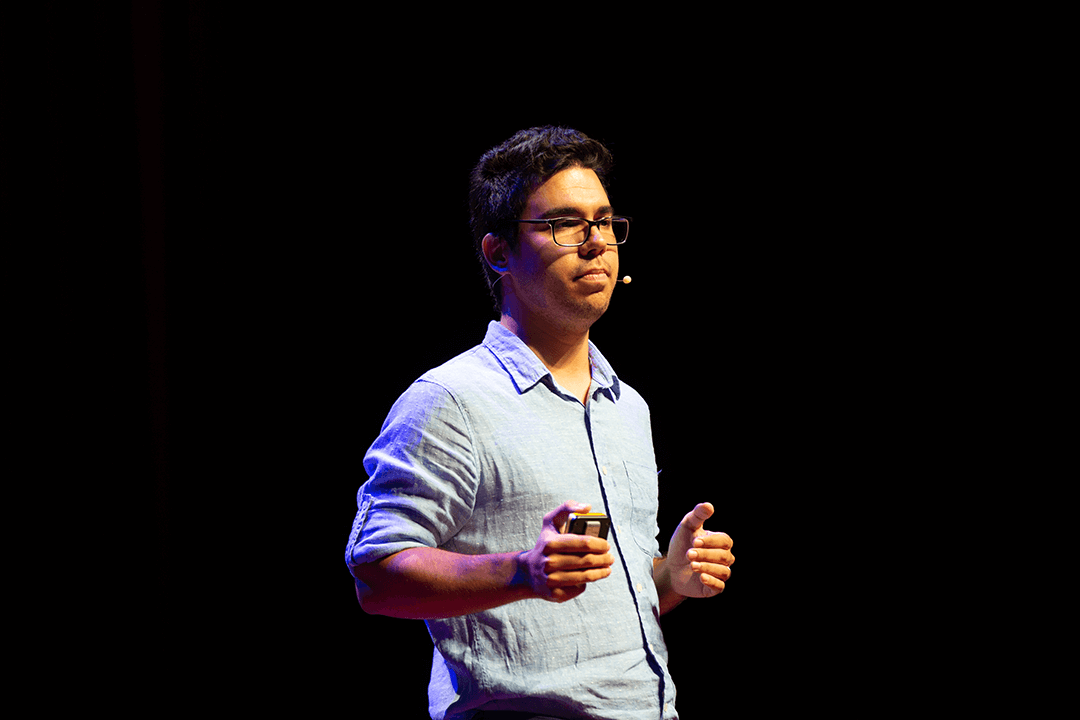
TEDxKAUST speaker and Ph.D. student Rúben Martins da Costa discusses the power of scientific literacy in the lives of children and adults alike. Photo by Khulud Muath
'Every Child is Born a Scientist' by Rúben Martins da Costa, KAUST Ph.D. student
In his talk, da Costa shared his views on the role scientists and scientific literacy can play in the lives of children and the general public.
[Astronomer and writer] Carl Sagan once said, "Every kid starts out as a natural-born scientist, and then we beat it out of them."
There are two takeaway messages here: First, that children are born with the traits that make someone an excellent scientist—they question everything, often experiment, learn from those experiments and are born unbiased towards a particular result. Unfortunately, the second part still applies, and in my opinion, we are still not fostering our little scientists the best we can.
Ever heard the term "kidsplaining?" Like when a kid learns something new and tries to explain it to an adult [who] knows way more about it than the child? Well, my vision is that this term gets recoined and that, by exposing our kids from a young age to high-level contemporary science, that one day my kid comes and tells me something about science that I didn't know—ideally, every day.
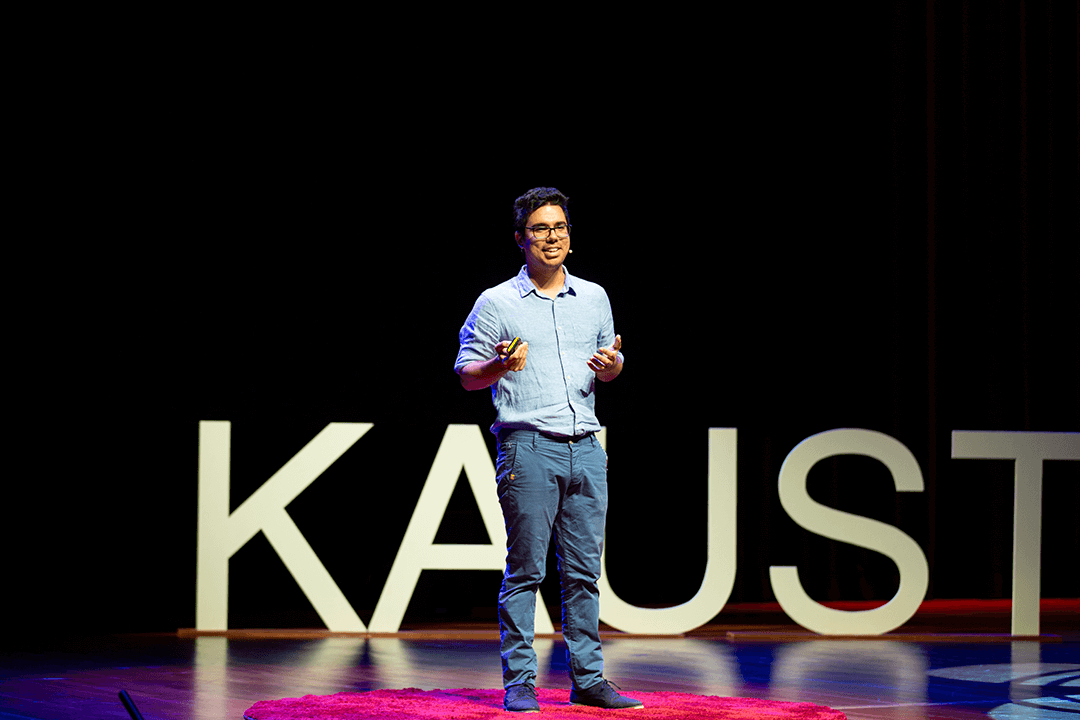
TEDxKAUST speaker Rúben Martins da Costa believes that scientists should 'routinely have an active role in the scientific literacy of children,' he said. Photo by Khulud Muath.
I see a world where scientists routinely have an active role in the scientific literacy of children. And once this happens, both sides will benefit, because platforms...[w]ill place us scientists in an active position to influence how our field of research is perceived by the future adults of this world. They will allow us to put a face on the anonymous scientist living in a child's head.
Scientific literacy is powerful! And the benefits of it can affect an entire community and even an entire society. One day, that child you worked with and introduced to your research might be the finance professional or politician with influence over the funding of scientific work or the journalist [who] will report findings in an accurate and unbiased way[.]
So, fellow scientists, leave the lonely lab, bring your lab coats and goggles somewhere else, keep 50 percent of your madness and start inspiring—but also be inspired. After all—we are all born scientists.
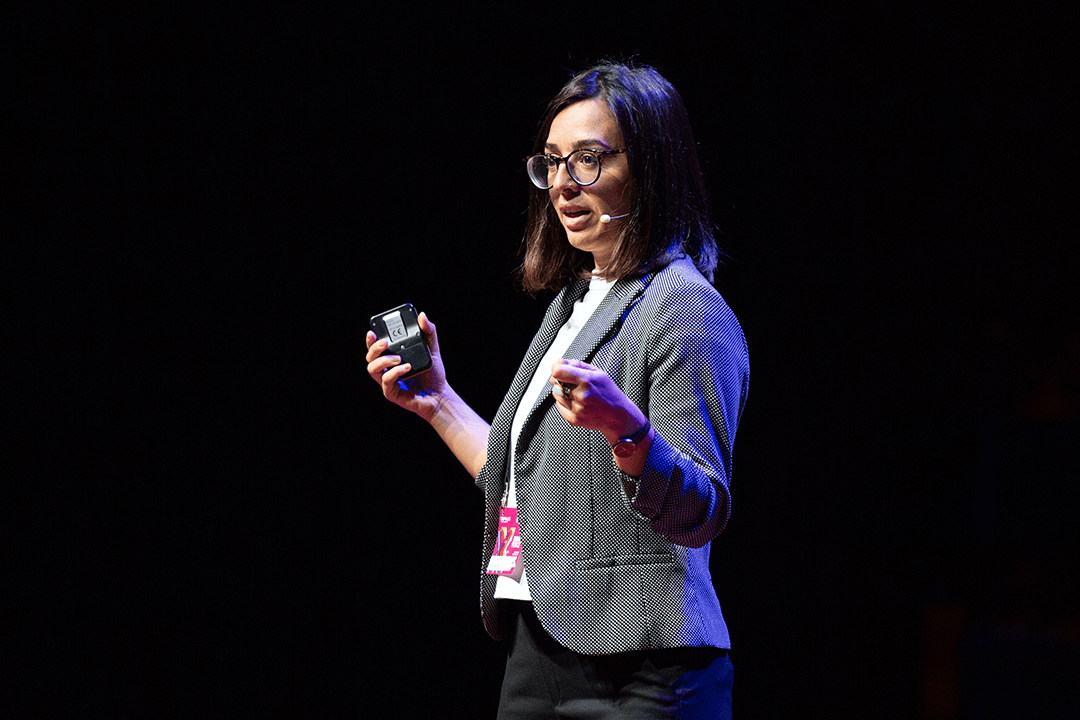
Sahika Inal, KAUST assistant professor of bioscience and a TEDxKAUST 2019 speaker, talks about moving out of her comfort zone during her early career as a scientist. Photo by Khulud Muath.
'Moving out of the Comfort Zone' by Sahika Inal, KAUST assistant professor of bioscience
In her talk, Inal shared what she believes to be the key elements for success. She discussed her career and the ability to move out of her comfort zone while asking audience members to do the same.
When I decided to go to graduate school, instead of learning more about what I already know, I wanted to do what I [hadn't] done before. I wanted to use my engineering skills to solve seemingly unrelated problems. This was a good call because if I hadn't moved away from the strictly marked borders of my own discipline and entered new zones, I could have probably never found out about the special polymers that are at the core of my research today.
But how do we get the courage to do this? Of course, moving into a new scientific field and...dar[ing] [to solve] problems that you may think that are too big for you sound[s] scary—because it means to move out of your comfort zone.
[T]here are two things that one needs to do: When moving out of the comfort zone, the first thing you commit to is hard work...When you work hard with a well-laid plan, you will realize that there is time for everything else. And it is that everything else—unrelated to your work—that is going to make your mind richer. The more open you are to the world around you, you will find more toys to play with, [and] these toys will diversify your mind [and] allow you [to] think about a problem from different perspectives.
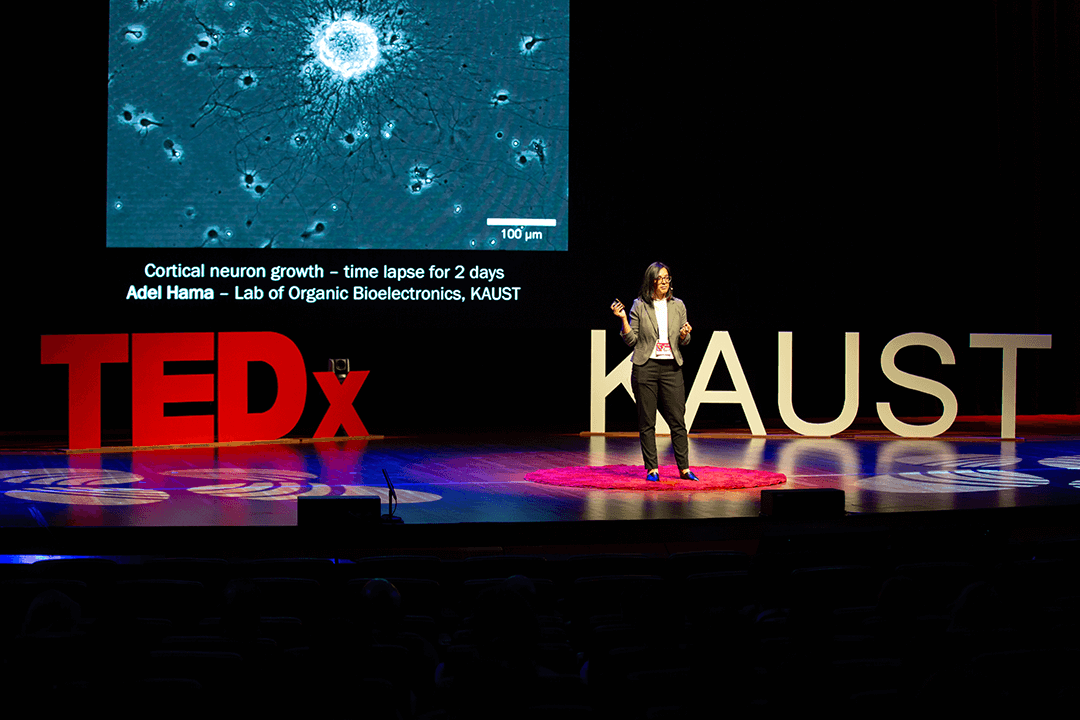
KAUST Assistant Professor Sahika Inal advised TEDxKAUST 2019 audience members remember that 'each of us has so much to contribute.' Photo by Khulud Muath.
This brings me to the second important rule of moving out of the comfort zone: respect for others. No matter what our professions are or how good we are at what we are doing, someone out there is very likely to have a better way of doing it. And this person can be an expert in something vastly different. But you will not know this until you respect that other voice and see the problems that we face more as common issues.
For me, interdisciplinary research is a natural outcome of me moving out of my comfort zone. It is a process of conceptual breakthrough, but most importantly, collective thinking. Only when you work hard—but with an ear open to others—you will be able to move out of your comfort zone and dare [to solve] big problems.
Now, I am here today sharing with you how I moved out of my own comfort zone as a textile engineer to design biosensors. My team and I develop bioelectronic devices that can hear the sound of the body and translate these sounds into a language that we humans can understand...So, if you like to move out of your comfort zone but don't think that you have the "genius genes" to do that, I suggest you just go ahead and see how you surprise yourself...Life is too short and each of us has so much to contribute, so let's not stay conformably stuck in one zone, shall we[?]
Related stories:

